I walk through a bunch of teenage boys – and a cloud of marijuana smoke – to get to the front door this morning. Judging by the looks I get from those sitting at the nearest computers, some of the smoke follows me inside.
It’s only 9.30 and, as ever, the front room is already busy. Five of the eight computers are in use and I see job applications, emails and some online learning on the screens as I make my way to the back offices.
The UCAN isn’t open to the public every day but on these open access mornings Rosanne and Carl deal with a torrent of enquiries that sees them flitting from customer to customer, trying to keep all the plates spinning.
This morning I’ve decided to shadow Rosanne for as long as I can keep up, to get an idea of her role as a UCAN project officer.
By the time I have my notebook in hand she is already helping a young woman at one of the computers.
“How do I send this now?” asks the young woman. Rosanne points at the screen and reminds her how to send the email, an application for a job. “Brilliant. Thank you.”
Another woman is standing in the middle of the room, waiting her turn. “Do you know what I do with this?” she asks, holding out some papers.
Rosanne scans the form and passes it back, “Next, you need to list everyone who is moving with you. Then please let me see it again before you send it. Do you need an envelope?”
Back in the small office from which Rosanne keeps on eye on comings and goings there is a small huddle of colleagues. Vanessa is leading a discussion about the homeless alcoholic man who is frequently outside their parade of shops. Minutes later the huddle breaks and Rosanne is out into the front room again.
“Hiya, are you all right?” she says to a man who has just side stepped the ‘cannabis crew’.
“Can I use the phone please?” he asks. “Do you have the number for Jobseeker’s?”
As Rosanne’s pointing out the numbers pinned up above the customer phone, another man is signing in, the front door barely having had time to close. This customer wants to use a computer.
“You might be better off with this one,” she says, directing him to one of the computers which is less temperamental. These machines get a lot of use and some are more reliable than others.
It’s not always clear to me which customers are new to the UCAN as Rosanne treats everyone as if she has known them for years. But within minutes – and after she has exchanged pouches with a colleague delivering the internal mail – she is telling this new arrival about the Tuesday job club which suggests he’s not a regular. “And then there’s the Clear Aims course which is brilliant,” she says. “Cath here can tell you more about that, if you’re interested.”
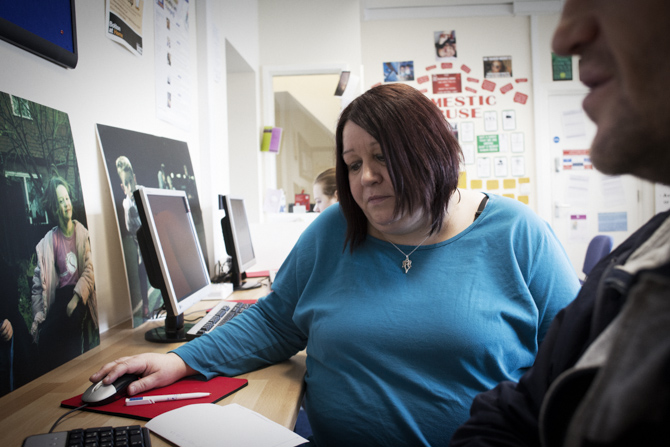
Next Rosanne is answering the telephone. “Half past 12,” she says to the caller. “Then work club from 1.30 til 4.00. Okay, see you then.”
She comes off the phone, beaming. “Why so happy?” I ask.
“That woman on the phone was referred by the Jobcentre. She was told to ask for Rosanne because ‘she’s fantastic’!”
A young mum has just appeared at the office door, gently pushing her daughter in front of her. “She’s starting nursery this afternoon, at the big school,” she declares. “Show Rosanne your uniform, Kelly.”
Kelly proudly peels back her coat to reveal a brand new blue sweatshirt. Rosanne makes a fuss over the little girl and she and her mother leave happy, only to be replaced by a middle-aged woman who looks as if she hasn’t slept in days.
“I’m being made redundant, Rosanne,” says the newcomer, barely able to contain her tears.
“Come and sit down,” says Rosanne, offering the only other chair in the room.
“Can I make you both a brew?” I ask as the office door is closed behind them. I’ve managed about 15 minutes.
In his tiny kitchen Lee is putting away the contents of two plastic bags. This is all he will eat for the next week, until he can make another visit to the food bank.
It’s mostly tins: oxtail soup, kidney beans, sweetcorn, ravioli, baked beans, tuna. There’s a couple of packets of biscuits and some out-of-date trifle sponge fingers; a box of chocolate-flavoured breakfast cereal, a litre of orange juice and a packet of pasta.
Fresh items are limited to whatever has been donated to the food bank that week so Lee unpacks of a packet of trimmed runner beans, three sunflower-seeded wholemeal rolls, and a red and a green chilli.
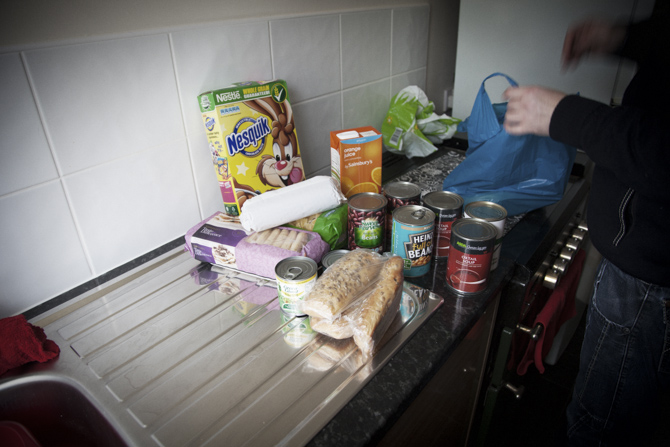
“Surely that won’t be enough,” I say, trying to imagine how these foodstuffs might be combined to make at least one meal a day for the next week. “Will you go hungry before next Monday?”
Lee nods.
“And what about the cereal? Have you got any milk to go with it?”
Lee opens his fridge, pulling out a half empty litre carton. “Sometimes you get long life milk but I’ve got this.”
“And what happens when that’s finished?” I ask.
He digs deep into one of his jeans pockets. “I’ve got £1.50 to buy some more,” he says. “And that’s it.”
Lee and I met for the first time just two hours ago. Monday is food parcel voucher morning at the UCAN and I was vaguely hoping I might find someone who I could accompany to pick up their supplies.
The UCAN staff all know Lee. They have supported him for some months now, most recently Rosanne has helped him apply for a citizen card – which the UCAN has paid for – so he’ll have the photo ID he needs for agency work. And for the past three weeks, they’ve given him vouchers for the food bank in town.
Up until November last year Lee had been working nights as an order picker at a fruit and veg warehouse. He enjoyed the work. One night he was ill, couldn’t get himself out of bed, and didn’t show up for work.
The next night he was still unwell and telephoned his boss. Apparently he’d already been replaced and his boss reported back to the Jobcentre that he had quit. In turn, the Jobcentre registered Lee as ‘voluntarily unemployed’ and has suspended his benefits for six months.
“It’s been getting me down, really down,” he says as Vanessa and I explain the idea behind the As Rare as Rubies blog, “I’ve been to the GP.”
“Come in tomorrow morning,” says Vanessa, knowing that today’s first concern is the food bank that opens just once a week. “We’ll make a list of priorities. It’s employment day and we can ask Cath to sit down with you. You’ve already spoken to Citizens Advice haven’t you?”
Pretty much every service the UCAN has to offer is relevant to Lee just now – employment advice, confidence-boosting, debt management, mental health support – and Vanessa is determined, as she now tells him, to get a team of professionals around him. But first, the food bank.
…. continued in The most generous
I’m nipping in between consultations. Except these are a bit more than consultations. This morning Mike has already had hour-long sessions with two of his new customers and after me, and presumably a bite of a sandwich, he is seeing two more.
He tells me these particular clients – because of depression, ill health, drugs or alcohol misuse – had been ‘parked‘ on Incapacity Benefit for some time, drawing benefit but not expected to find work.
Since the welfare reforms these men, and they are mainly men, find themselves having to get to grips with the flawed Universal Jobmatch online employment site and the increasingly rigorous demands of the Job Centre.
I like that the UCAN can be super-responsive. As a new need arises it adapts what if offers or adds something new into the mix. Which is why Vanessa has commissioned Mike, the CV-writing guru and career coach from Tuesday’s job club, to work closely with a number of hand-picked, long-term unemployed residents.
“There’s a part of Breightmet that is ranked pretty highly among the indices of most deprived areas in the UK,” says Mike. “Bolton at Home has researched the figures and there’s a particularly high incidence of people who are on, or had been on, Incapacity Benefit.”

“So what sort of people are we talking about? Can you describe them?”
“One of the guys has been without regular work for more than 20 years, others for over 10,” says Mike.
“The younger ones obviously less so but with all of them substance misuse is a common theme. Interestingly, There is also an almost universal lack of confidence around literacy, particularly spelling. They can read well enough but writing is an issue.”
“But isn’t the JobCentre helping this group?” I ask. “As you say, they have been economically inactive for so long, surely they can’t be expected to job search without any support?”
“If I was in the JobCentre’s shoes, I’d argue they are being offered a lot,” says Mike. “But it’s inevitably very prescriptive given the volumes of candidates they are dealing with. One guy has been put on the Work Programme for new claimants and another has been sent along to Bury College to have his basic skills assessed… but now he has to wait two or three months before there’s a literacy course available. So there is support, but it tends to be less tailored. Does that make any sense?
“Yes. Yes, it does. But what are you doing differently?”
“I’ve come in with an open mind. We want to make sure their interaction with the JobCentre and with Universal Jobmatch is as positive as it can be. But what is fascinating and unexpected is how much the guys are opening up to me about themselves and about what’s stopping their progress. And there have been things I can do to help.”
“Like?”
“For instance, one guy at the end of our first session told me he was really self-conscious of his teeth. He hadn’t had dental treatment for 10 years and had very bad teeth, so bad they were affecting his self-confidence.
“So I organised a local NHS dentist to see him, even paid for a taxi to get him to one of the appointments and next week he’s being fitted with a new set of false teeth. He’s delighted, he can’t wait.”
“That’s brilliant. I like that.”
“Another guy is nervous of speaking on the phone and so doesn’t have a mobile. Of course, if you’re searching for work, coming across well in a phone call can be important. So I got him a cheap mobile from Asda and some credit and suggested he used it to order takeaway food, for instance. I call him from time to time and he’s even spoken on the phone to Vanessa now. It’s a little step which has improved his ability to function.”
“It comes down to seeing people as individuals, doesn’t it?” I say
“These are little gestures but quick wins, small victories that are showing them we can make progress. What’s fascinating is how freshly motivated a couple of them are at least, to get a job. I’m not going to put myself out here as the ‘fairy jobfather’ but I do think, in the right circumstances, two of them could be employed in the near future by someone and do well.”
“And the others?”
“Motivationally, they’re not quite ready yet.”
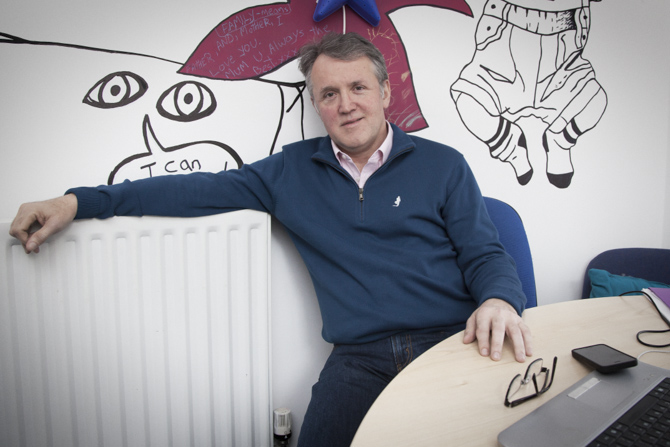
This is week four in a six-week project. After his ‘quick wins’ Mike has started working on what he calls ‘reframing’ the life story. “To begin with they’d all talk very negatively about themselves: drug and alcohol problems, being out of work, being homeless maybe. But now we are moving towards a more positive life story.
“We’re beginning to find the positive elements about them and getting them to express them more openly: are they a family man? Do they like working with other people? Maybe they enjoy the outdoors… anything really to get them thinking differently, and expressing their life stories more positively.
“The aim is to them more attractive to employers. None of it is untruthful, just a skewing of their story in their favour really.”
What Mike is doing over six hours isn’t rocket science. He’s building self-esteem, giving people time, allowing them to discover what they’ve got to offer. It’s personal and it’s making an impact.
As a little pilot study there are some important lessons to be learnt… and not just by the UCAN.
“I enjoy the little differences I am seeing already,” he says as I get ready to take his portrait. “And I hope they are too. It’s very satisfying.”
John is looking out for me from his living room window. This is a big day for him. A day that could significantly change the rest of his life.
I introduce myself on his doorstep. His handshake suggests a lifetime of manual work although I know this isn’t how it’s panned out.
“Sorry, I don’t know the way,” I say as we settle into my car.
“Straight to the end and turn right,” he says.
By the time we’ve reached the T-junction I’ve determined that John is 49, moved from Heywood to Breighmet two years ago and has a one-year-old daughter with his new partner.
“And four kids from my previous relationship,” he tells me.
“So you’re doing it all again. How does that feel?” I ask, recalling all that sleep deprivation.
“It keeps you young,” he replies.
John has been attending the little pilot course that Mike has been running at the UCAN. It’s for people who have been on Incapacity Benefit and have now found themselves re-assessed and on Jobseekers’ Allowance.
“One day I was telling him how self conscious I feel about my teeth. Next left. The next minute he was making an appointment for me at this dentist. That was two weeks ago.”

“And what happened at that first appointment?”
“I was sent for an X-ray at the hospital. I went back on the Wednesday and he took half of them out right then. I went again on the Thursday and he took the other half out.”
I wince. “How many did he take out each time?”
“About ten.”
“Ten in one go, and then another ten?”
“Yeah.”
“Oh my god. What was that like? It must have been traumatic. Right or left here?”
“Left. When I came out of the dentist I felt someone had hit me in the face with a bat. And the next day it felt like someone had hit the other side,” John jokes. “But on the good side, I’ve lost over half a stone because I can’t eat anything.”
Perhaps to give John a fighting chance until his dentures are ready, the dentist has left a couple of yellow pegs in his bottom jaw. “So what have you been eating in the meantime?”
“Soup.”
“If you don’t mind John, tell me about being on Incapacity Benefit.”
“I was on the sick for a while because I used to have quite a bad alcohol problem. I sorted that out but, because I’d stopped drinking, I ended up with an amphetamine problem.
“Then five years ago my wife left me and I had my eldest daughter living with me. I decided then that I needed to sort my life out and haven’t touched anything since.”
“So your teeth wouldn’t have been a priority in those times when you were alcohol and drug dependent?”
“No, no. I kept putting it off but it really affected me. I couldn’t clean my teeth because the gums would bleed the whole time and so I had bad breath. I’d always hold my hand over my face and was really worried people were looking at my teeth. They were a mess. Turn right at the lights.”
“So this is part of a process of sorting yourself out?”
“I think my confidence will be a lot higher. I’ve been looking forward to today. It’s just here.”

Inside it takes a bit of explaining why John has a photographer in tow but the dentist is happy enough to let me take a picture once the new teeth are fitted.
John emerges and is indeed delighted. I buy us both a celebratory cheese and ham sandwich from the bakers next door before I drive him home.

Mike calls this a ‘quick win’ and there’s no doubt it is, but that seems to understate the significance of today. It’s been a turning point, a new start even and I make a mental note to catch up with John in a few weeks to see how things are going.
He checks the fuel, sets the starter and gives a yank on the cable. The strimmer roars as he clips the machine onto his harness. He’s off sweeping from side to side, taking the heads off dandelions and sending grass cuttings into the air.
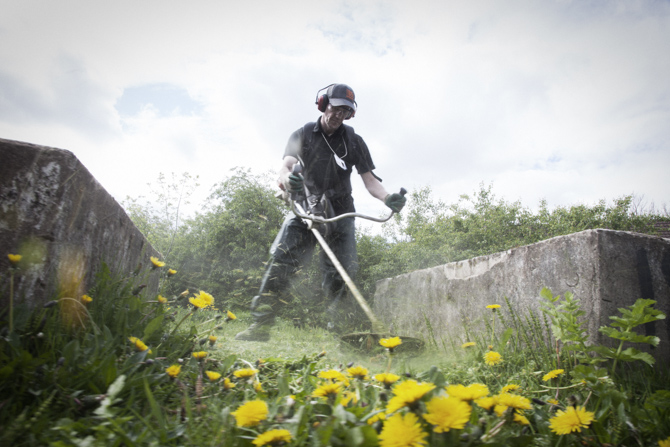
“Slow down a bit Sean,” shouts Paul above the noise. “Slow down or you’ll tire yourself out before long.”
The last time I saw Sean he was sat in front a computer with Rosanne. He’s been getting some intensive support from the UCAN these last two months.
“I’m just coming out of a depression,” he tells me after Paul has suggested he give the machine a break. “But all this has brought me out of my shell.”
As part of the new welfare reform regime Sean has been moved onto Jobseekers’ Allowance from Incapacity Benefit. It hasn’t been easy for him. Down at the UCAN he’s signed up for IT training and regularly attends the job club. He’s also been one of Mike’s mentees.
“Yes, I’ve been having one-to-one with Michael. He’s all right, Michael. He got me my specs.”
Another quick win. The UCAN staff realised that Sean was having difficulty with his reading and quickly diagnosed eyesight issues. It was Mike who got him in front of the optician.
“I used the bottom of a glass to read,” recalls Sean with a laugh. “Now it’s a lot less bother. I can just pick up a paper and read it straight away.”
We’re round the corner from the UCAN at the Red Lane allotments. Paul works for the Mojo Trust (still known by many as their previous incarnation, Bolton Wise), an organisation that trains unemployed people in all things horticultural.
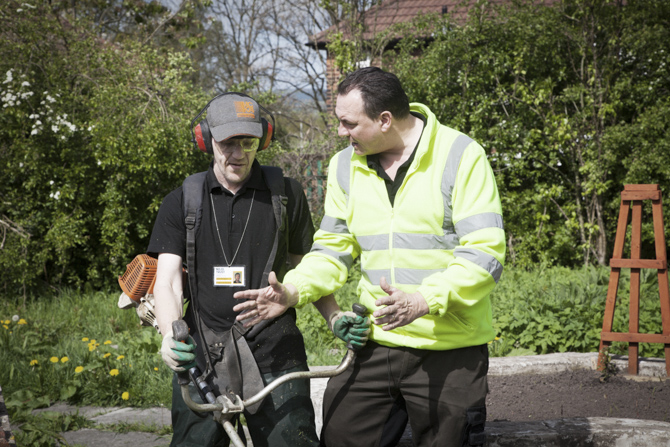
“We take trainees through an NVQ in Amenity Horticulture and Hard Landscaping,” he says. “They’ll usually do two days a week for 12 weeks and come out with a qualification and some experience.
“And yes, it is about qualifications but it’s also about keeping people busy and learning social skills. If you’ve been out of work for a while you tend to forget how to talk to people, and just getting out of the house, doing something different, can be very motivational.”
This ‘Estate Rangers’ project is part of the UCAN’s big push to help specific clients who have been long-term unemployed, which I have been writing about over the last few blog posts. Like all things UCAN, it’s joined-up and tailored to the individual.
There should be more at this morning’s session but other participants have appointments to attend. Steven is tending one of the raised beds. “This is actually my own bed,” he says, “I come down at other times but I’m just learning all this green stuff. I’ve got potatoes, broad beans, onions…”
“… and this is mint here,” I say, plucking and smelling a leaf, “nice boiled with new potatoes.”
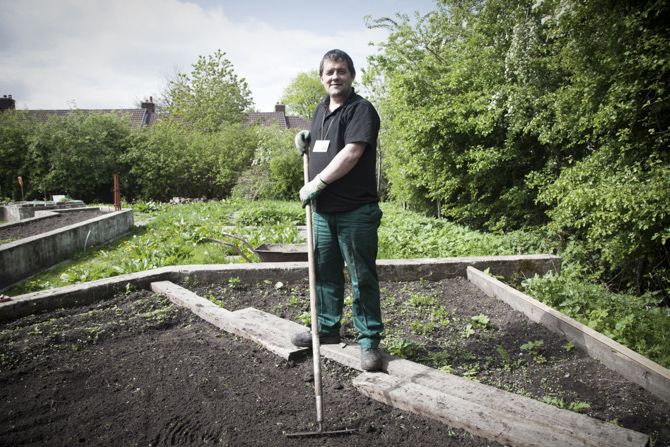
Ten years ago Steven was an industrial window cleaner but hasn’t worked since. He and his ex-partner have both had issues over substance mis-use and their two children no longer live with either of them.
“I’ve changed my life around in the last seven or eight months,” he says, “and the authorities just need to see me keep it going. All I want is my children back home.”
“And all this helps?” I ask waving my arm around the allotment.
“Yeah, it does help. Otherwise I’d be stuck in, being bored and possibly tempted again. I don’t want that. Things are looking up but it’s been hard, very hard.”
I leave them to it as Steven takes his turn with the strimmer.










